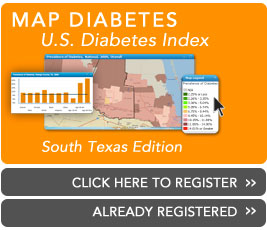Posted by Staff
Minority Diabetes Reports
Thursday, June 27th, 2013
BWHI: June 24, 2013
The prevalence of type 2 diabetes—a potentially life-threatening condition where blood glucose levels are above normal—is a growing problem in the United States. Currently one in 10 Americans has the disease, and the Centers for Disease Control and Prevention (CDC) estimates that one in three is likely to have it by 2050 if the current trend continues.
In 2012, the Black Women’s Health Imperative (the Imperative) was selected along with five other national organizations to help carry out the CDC’s four-year National Diabetes Prevention Program to help reduce the rate of type 2 diabetes in this country. The program offers a yearlong lifestyle change intervention that focuses on preventing type 2 diabetes among persons at risk for developing diabetes and encouraging employers and insurers to offer the program as a covered health benefit. Read more
Posted by Staff
Minority Diabetes Reports
Thursday, June 27th, 2013
The Diabetes Educator June 21, 2013
Purpose The purpose of this study is to examine the relationship between negative emotions and bio-behavioral risk factors among Korean immigrants at risk for type 2 diabetes (T2DM).
Methods Data were collected from 148 Korean immigrant adults who are “at risk” for T2DM as defined by having family history of T2DM in first-degree relatives, body mass index greater than 23, or history of gestational diabetes in women. Participants completed questionnaires and underwent biological measures. Negative emotions included feeling nervous, hopeless, restless, anxious, and stressed as well as depressive symptoms. Read more
Posted by Staff
Clinical Trials
Thursday, June 27th, 2013
Diabetes Care July 1, 2013
OBJECTIVE To evaluate the feasibility of a wearable artificial pancreas system, the Diabetes Assistant (DiAs), which uses a smart phone as a closed-loop control platform.
RESEARCH DESIGN AND METHODS Twenty patients with type 1 diabetes were enrolled at the Universities of Padova, Montpellier, and Virginia and at Sansum Diabetes Research Institute. Each trial continued for 42 h. The United States studies were conducted entirely in outpatient setting (e.g., hotel or guest house); studies in Italy and France were hybrid hospital–hotel admissions. A continuous glucose monitoring/pump system (Dexcom Seven Plus/Omnipod) was placed on the subject and was connected to DiAs. Read more
Posted by Staff
Clinical Trials
Thursday, June 27th, 2013
News Medical June 25, 2013
Therapy produced stable glucose and hemoglobin A1C readings, and weight loss
Patients with type 2 diabetes fare significantly better if they are started on three medications at the time of diagnosis than if they are prescribed a single drug and have other therapies added later, a San Antonio researcher said June 22 at the 73rd Scientific Sessions of the American Diabetes Association in Chicago. The findings, from a study funded by the association, could revise the way physicians manage the endocrine disease.
Comparison
UT Medicine San Antonio physician Ralph DeFronzo, M.D., chief of the Diabetes Division in the School of Medicine at The University of Texas Health Science Center at San Antonio, presented two-year results from 134 participants studied at University Health System’s Texas Diabetes Institute. Read more
Posted by Staff
Clinical Trials
Thursday, June 27th, 2013
NEJM: June 24, 2013
BACKGROUND
Weight loss is recommended for overweight or obese patients with type 2 diabetes on the basis of short-term studies, but long-term effects on cardiovascular disease remain unknown. We examined whether an intensive lifestyle intervention for weight loss would decrease cardiovascular morbidity and mortality among such patients.
METHODS
In 16 study centers in the United States, we randomly assigned 5145 overweight or obese patients with type 2 diabetes to participate in an intensive lifestyle intervention that promoted weight loss through decreased caloric intake and increased physical activity (intervention group) or to receive diabetes support and education (control group). The primary outcome was a composite of death from cardiovascular causes, nonfatal myocardial infarction, nonfatal stroke, or hospitalization for angina during a maximum follow-up of 13.5 years Read more
Posted by Staff
Clinical Trials
Thursday, June 27th, 2013
The Diabetes Educator June 19, 2013
Purpose The purpose of this comparative effectiveness study is to compare diabetes self-management support (DSMS) approaches and determine who can be most effective in helping patients maintain/improve clinical outcomes, self-care behaviors, distress, and satisfaction following diabetes self-management education (DSME) delivered in primary care.
Methods After receiving DSME, 141 participants were randomized to receive DSMS delivered by a trained supporter: educator, peer, practice staff, or usual education during a 6-month follow-up period. Read more
Posted by Staff
Clinical Trials
Thursday, June 27th, 2013
Diabetes Care May 21, 2013
Detection and interpretation of adverse signals during preclinical and clinical stages of drug development inform the benefit-risk assessment that determines suitability for use in real-world situations. This review considers some recent signals associated with diabetes therapies, illustrating the difficulties in ascribing causality and evaluating absolute risk, predictability, prevention, and containment. Read more



























